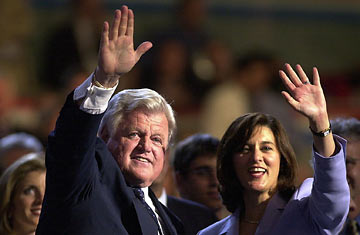
Senator Ted Kennedy and his wife Vicki wave to the Democratic National Convention at the Staples Center in Los Angeles
Their families were longtime friends, and she had once interned in the mailroom of his Senate office. Still, Ted Kennedy and Vicki Reggie were a most unlikely match. When their paths crossed in June 1991, he was a hard-partying politician whose indiscretions and appetites had become a national joke. She was a whip-smart single mom, more than 20 years his junior, who had little time for a social life as she balanced the needs of her two small children with the demands of a high-powered legal career. But when Ted attended a 40th anniversary dinner she threw for her parents, they talked for hours in the kitchen. He was smitten.
Vicki was born in 1954 in Louisiana. Her parents, the Reggies — a judge and a Democratic National Committee member — were friends with the Kennedys going back to the 1956 convention, when they supported Jack for Vice President; in 1980, Vicki's mother Doris was the only convention delegate from Louisiana to vote for Ted for President. Vicki had interned in Kennedy's office in 1976, the summer she graduated with honors from Sophie Newcomb College in New Orleans. She and Ted had seen each other at social occasions with her parents over the years. When they started dating, he had been divorced for nearly a decade from his first wife, Joan, and she was the divorced mother of a 5-year-old girl and an 8-year-old boy.
By Labor Day, Kennedy, then 59, was showing up at her house every night for dinner. As Vicki later recounted to Kennedy biographer Adam Clymer, "He called me and said, 'You've got these kids. I know you won't go out more than a couple of times a week. I really want to see more of you. So I am going to come to dinner at your house.' " Often, those dinners were interrupted by the needs of her children; she once tried to apologize, but he wouldn't hear it. "No, you don't understand," he told her. "A child calling 'Mother' is the most beautiful sound in the world." He proposed during a performance of La Bohème in January 1992, but they managed to keep their engagement a secret until Vicki's daughter spilled the news two months later to a kindergarten classmate, whose parent happened to be a Washington Post reporter. They were married in front of his living-room fireplace on July 3; his gift to her was a painting of daffodils.
At first, the surprise in Washington's power circles was such that some people whispered that the relationship was nothing more than a marriage of political expedience. His Massachusetts approval ratings were dipping below 50%, and he badly needed a fresh story line to lay on top of the embarrassment that came with his testifying in the 1991 Palm Beach rape trial of his nephew William Kennedy Smith and the subsequent indignity of having to sit mute through the sexual-harassment allegations against Supreme Court nominee Clarence Thomas. In his 1994 re-election campaign, Kennedy faced a surprisingly strong challenge from a squeaky-clean businessman named Mitt Romney; Vicki turned out to be Ted's biggest asset.
But as years went by, those who were close to him began to realize that Ted's relationship with Vicki had finally put his tumultuous private life on track. For the first time, Ted Kennedy was part of a family that seemed ... normal. He showed up at soccer games and went trick-or-treating. I interviewed him one evening in 1994 at their home in McLean, Va.; several times during the session, Vicki popped in to assure me that the wailing down the hall was nothing more serious than the protests of a little boy who didn't want a loose tooth pulled.
Vicki kept Ted focused and grounded, sometimes to the point that her influence caused tension with the larger Kennedy clan. And when he became ill, she was his protector, overseeing his treatment and deciding when and where he could make his rare public appearances. It was widely reported that Ted wanted to see Vicki replace him in the Senate, though family sources insist that she is not interested in the job.
Ted Kennedy was redeemed in his third act, and that redemption couldn't have happened without Vicki. "I had not ever really intended to get married again," the Senator once told the New York Times. "The people who had been closest to me over the course of my life had disappeared, with that enormous amount of emotion and feeling and love, I thought I probably wouldn't want to go through that kind of experience again." Giving his heart one more chance was probably the best decision Ted Kennedy ever made.
